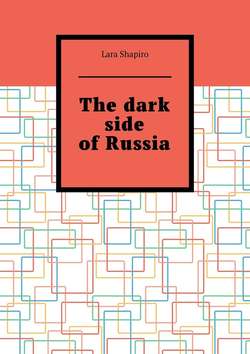Читать книгу The dark side of Russia - Лара Шапиро - Страница 5
My address is not a house or street (a USSR song)
ОглавлениеWhen Rebecca was five years old, she had many questions in her head. For example, what is the meaning of life? Or what is electric current? But for all these childish questions, adults answered with an annoying phrase: – when you grow up, you will understand.” – What should Rebecca understand? That adults skipped physics classes at school? That they have limited vocabulary and lack of communication skills with children?
At six years old, Rebecca learned to read, found a physics textbook for the 6th grade of the Soviet school curriculum and read that “electric current is an ordered movement of negatively charged particles.” Is it so difficult to explain this to a five-year-old child? What is the difficulty? Children are creative; what they don’t understand, they will fantasize.
The knowledge of the world was imposed through verses by Agnia Barto about irresponsible and mediocre children:
Our Tanya is crying loudly
dropped the ball into the river,
hush, Tanya, don’t cry,
The ball will not drown in the river.
That is, some fool, named Tanya, dropped a ball into a river, and instead of jumping fast into the water, or running after a stick and catch the ball, this Tanya stands and roars. Rebecca did not pity Tanya; she was sorry for the ball.
Rebecca had many strange poems as a child. For example:
If you take all these puddles
and combine into one,
it turns out that a puddle
is no worse the black sea.
Such a bonus action from the Soviet Union: collect puddles – get the sea.
One song was the scariest – “my address is not a house or a street; my address is the Soviet Union.” – So, a person doesn’t have a home; he doesn’t even have a street. He disappeared, lost, vanished in the vast space of USSR.
As you might have guessed, dear reader, Rebecca’s childhood passed in the Soviet Union, almost in prison. No, she was not there, but she was originally from Kopeysk, and Kopeysk was a little town of mines Chelyab-Kopi and jails with the hard-labour regime. A person of such a town, who entered into adulthood, had two choices: either coal mine or prison.
Now it’s fashionable to write about how good it was in the Soviet Union, an ice-cream for 10—15 pennies, free medicine, guaranteed jobs. The Rebecca family lived near the YV48/1 hard regime prison. The prisoners made ball bearings, then the ball bearings were driven 80 kilometers to Chelyabinsk, registered and brought back for use. Very wise logistics and business organization.
Mom Rebecca worked in the city court; the doors were often changed there, almost every day. In the morning, before lunch, one team removed the doors, after lunch, another group set them back, because the constitution of the USSR guarantees no unemployment.
Mom Rebecca was a lawyer of the old school, and the lawyers of the old school had a saying: if an accountant worked in one place for five years, then undoubtfully you can put him in prison for ten years. That’s all you need to know about accounting, and the financial-economic system of the Soviet Union.
Mom Rebecca worked as a judge and once one of her defendants, in court, said: – well, I was stealing big my whole life, and nothing happened, but then stole some little things – a train of refrigerators. Just a train of refrigerators and I was caught for these little things? – Do not steal little, steal a lot; no one will notice. Oh, what a country we lost!
Mom often kept her lawsuits at home. In the absence of adults, Rebecca loved to poke her curious nose into all these matters. How many new things she learned! Cases of rape, in delicate details; dozens of lawsuits for murders of children by their mothers because their cohabitants did not need women “with baggage”. Here the mother carefully put her sons, three and five years old, in a boat, and sent them on a free trip around the lake. The eldest drowned, the youngest survived. Another mother drowned her sons in the ice-hole, like kittens. The third cut the child into pieces, by an axe, and fed the dogs. And all this happened in the Soviet Union, in a state of profound brotherhood, equality and socialist idyll. Rebecca was a child, ten to twelve years old, and for a long time she hated adults, realizing that children needed protection from them.
There were more pretensions cases related to safety in factories and mines. There was a global theft of federal funds intended for updating equipment and compline with the standards. The standards were not respected, the outdated equipment was not replaced properly, but new castles and villas for the factory elite, mine directors and their associates grew with dashing regularly and stably. Mines collapsed, crane beams fell in factories, killing dozens and hundreds of people. Still, it was banal, trivial, dull and uninteresting, because these people were ordinary, not nomenclature, elite or their relatives. They were workers and miners, simple hard-working people, and this was their main fault. Rebecca read all these endless, long, diverse law-cases, and the whole country seemed to her one falling crane beam.
